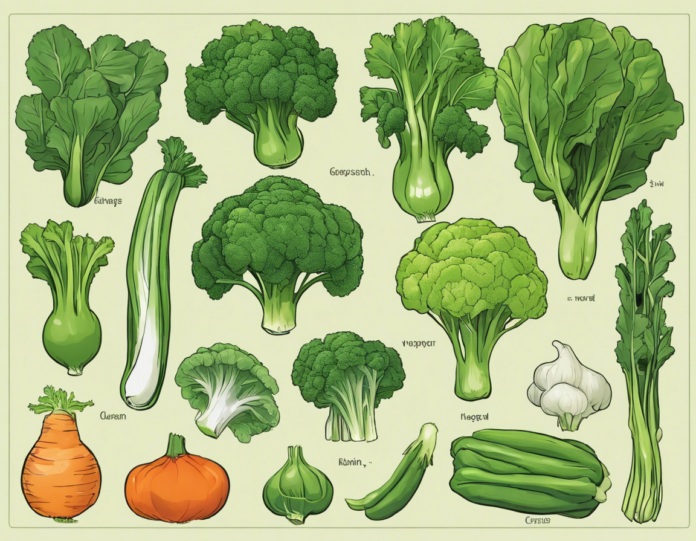Introduction
Spinach is a nutrient-dense leafy green vegetable that has been esteemed for its numerous health benefits for centuries. It belongs to the amaranth family and is closely related to beets and quinoa. Spinach is commonly consumed around the world in various forms, such as salads, smoothies, soups, and sautés. Its versatility, vibrant green color, and mild flavor make it a popular choice for incorporating into a healthy diet.
Nutritional Profile of Spinach
Spinach is packed with essential nutrients that contribute to overall health and well-being. It is an excellent source of vitamins and minerals, including:
- Vitamin A: Critical for vision health and immune function.
- Vitamin K: Important for bone health and blood clotting.
- Vitamin C: An antioxidant that aids in collagen production and immune support.
- Folate: Essential for cell division and DNA synthesis.
- Iron: Vital for oxygen transport in the blood.
- Calcium: Crucial for bone health and muscle function.
- Magnesium: Necessary for over 300 biochemical reactions in the body.
- Potassium: Important for maintaining healthy blood pressure.
In addition to these vitamins and minerals, spinach is a rich source of antioxidants and phytonutrients like lutein and zeaxanthin, which promote eye health, and quercetin, which has anti-inflammatory and anti-cancer properties.
Health Benefits of Spinach
- Supports Heart Health:
- Spinach is rich in potassium and magnesium, which help regulate blood pressure and support cardiovascular health.
-
The antioxidants in spinach, such as vitamin C and beta-carotene, help prevent oxidative stress and reduce the risk of heart disease.
-
Promotes Bone Health:
- Spinach is an excellent source of vitamin K, which is crucial for bone mineralization and calcium absorption.
-
Its high calcium content also contributes to maintaining strong and healthy bones.
-
Aids Digestion:
- The fiber content in spinach promotes healthy digestion and supports a balanced gut microbiome.
-
It helps prevent constipation and promotes regular bowel movements.
-
Boosts Immune Function:
-
The array of vitamins and antioxidants in spinach support a healthy immune system by combating free radicals and boosting immunity.
-
Supports Eye Health:
-
The lutein and zeaxanthin in spinach help protect the eyes from age-related macular degeneration and cataracts.
-
Weight Management:
- Spinach is low in calories but high in nutrients, making it a great addition to a weight loss or weight management diet.
- Its high fiber content helps you feel full and satisfied, reducing the likelihood of overeating.
Incorporating Spinach Into Your Diet
There are numerous ways to enjoy the health benefits of spinach:
-
Salads: Use fresh spinach leaves as a base for salads topped with your favorite veggies, proteins, and dressings.
-
Smoothies: Add a handful of spinach to your fruit smoothies for an extra nutrient boost without altering the taste significantly.
-
Soups and Stews: Incorporate spinach into soups and stews during the last few minutes of cooking for added color and nutrients.
-
Sautéed or Stir-Fried: Quickly sauté spinach with garlic and olive oil for a simple and delicious side dish.
-
Wraps and Sandwiches: Replace traditional lettuce with spinach leaves in wraps and sandwiches for added nutrients.
Buying and Storing Spinach
When purchasing spinach, look for fresh, vibrant green leaves without any signs of wilting or yellowing. Store spinach in the refrigerator in a plastic bag with a paper towel to absorb excess moisture, which can cause it to wilt faster. Wash spinach thoroughly before use to remove any dirt or impurities.
FAQs About Spinach
Q1. Is raw spinach better than cooked spinach?
– A: Both raw and cooked spinach offer health benefits. Cooking spinach can help release more nutrients and reduce oxalates, which can interfere with mineral absorption.
Q2. Can I freeze spinach for later use?
– A: Yes, you can freeze spinach for later use. Blanching it before freezing helps preserve its color and nutrients.
Q3. Are there any drawbacks to eating spinach regularly?
– A: Spinach contains oxalates, which can bind to calcium and iron, potentially reducing their absorption. However, this is typically not a concern for individuals with a balanced diet.
Q4. How much spinach should I eat in a day to reap its benefits?
– A: Including spinach in your meals a few times a week can provide a variety of nutrients. There is no specific daily requirement, but aim to consume a diverse range of vegetables.
Q5. Can spinach help with iron deficiency?
– A: Spinach is a source of non-heme iron, which is not as easily absorbed as heme iron from animal sources. Pairing it with vitamin C-rich foods can enhance iron absorption.
In conclusion, spinach is a powerhouse of nutrients that offers a wide range of health benefits. Whether consumed raw in salads or cooked in various dishes, this leafy green vegetable is versatile and delicious. By incorporating spinach into your diet regularly, you can boost your overall health and well-being.









